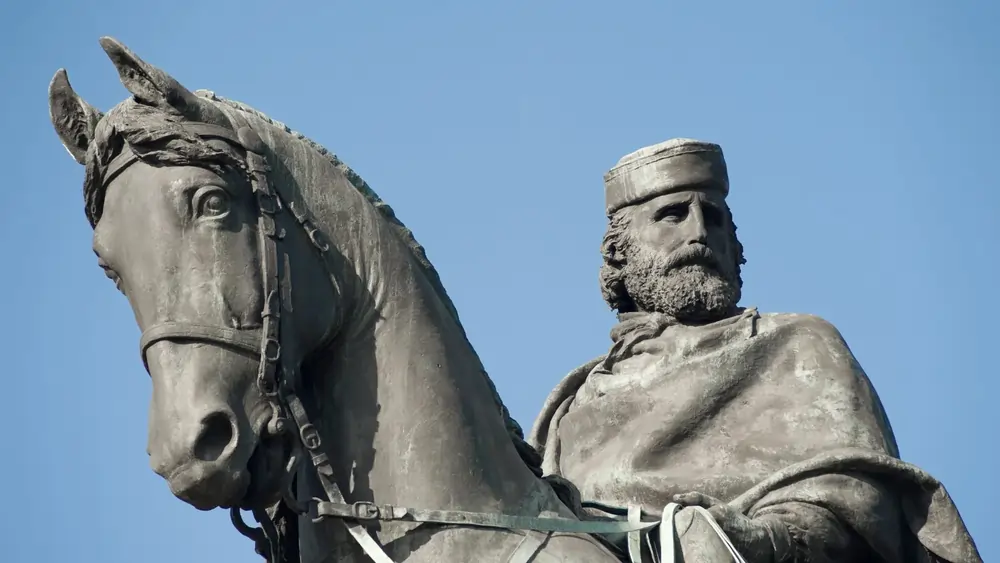

Si alguna vez has viajado a Italia, seguramente habrás visto su nombre en calles, plazas y estaciones importantes.
También es común encontrar estatuas dedicadas a él en muchas ciudades italianas.
📌 Giuseppe Garibaldi es una figura central y controvertida en la historia de Italia.
Fue un héroe del "Risorgimento" italiano, el proceso que llevó a la unificación del país en el siglo XIX.
💡 Nota: La historia de la unificación de Italia es un tema complejo que requiere un artículo aparte.
Aquí nos centraremos en las aventuras y hazañas de Giuseppe Garibaldi.
📌 Para entender mejor su historia, aquí tienes algunos de los eventos clave en su vida:
✔ 1807 → Nace en Niza.
✔ 1835 → Huye a Brasil, tras ser condenado a muerte por actividades subversivas.
✔ 1848-1849 → Primera Guerra de Independencia Italiana.
✔ 1859 → Segunda Guerra de Independencia Italiana.
✔ 1860 → Parte con "Los Mil" hacia Sicilia, en la expedición que cambiaría la historia de Italia.
Antes y durante su exilio en América del Sur, Garibaldi mantuvo contacto con "La Joven Italia", la organización política que promovía la unificación italiana y que lo había obligado a exiliarse.
🔹 Sin embargo, en América, Garibaldi luchó por otras causas:
✔ Independencia de Río Grande contra el Imperio de Brasil.
✔ Guerra en Uruguay, apoyando a Rivera contra el dictador Oribe.
📌 Durante estas campañas, Garibaldi perfeccionó sus habilidades militares, acompañado por su esposa Anita Garibaldi, a quien conoció en Brasil.
🔹 Su experiencia como marino y estratega lo preparó para convertirse en el líder legendario que más tarde lucharía por Italia.
Garibaldi tuvo una relación complicada con el Reino de Cerdeña-Piamonte, el estado que lideró la unificación de Italia.
✔ A pesar de sus diferencias, el reino siempre reconoció su capacidad militar.
✔ En ambas guerras de independencia, dirigió su propio ejército de voluntarios.
📌 Durante la Segunda Guerra de Independencia (1859), sus tropas se llamaron "Cazadores de los Alpes".
✔ Se movían más rápido y lograban victorias contra los austríacos en las montañas.
✔ Sin embargo, sus victorias nunca fueron decisivas, ya que muchas veces se vieron anuladas por las derrotas militares y diplomáticas del Reino de Piamonte.
Después de la paz con Austria, Garibaldi se retiró a Caprera.
Pero en 1860, tras enterarse de una revuelta en Palermo, decidió actuar.
✔ Organizó un ejército de voluntarios con 1.084 hombres.
✔ Zarparon hacia Sicilia y desembarcaron en Marsala el 11 de mayo de 1860.
✔ El 7 de septiembre, entraron en Nápoles, capital del Reino de las Dos Sicilias.
✔ En pocos días, derrotaron a un ejército de más de 90.000 hombres.
📌 ¿Por qué fue tan extraordinario?
Garibaldi luchó y ganó una guerra prácticamente solo, con un pequeño ejército, apoyado por voluntarios locales que se unieron a su causa.
🔹 Este evento marcó un punto de inflexión en la unificación de Italia.
Tras su victoria, entregó el sur de Italia al Reino de Cerdeña-Piamonte, creyendo que eran los únicos capaces de garantizar la unidad del país.
📌 Después de la expedición de los Mil, el gobierno italiano le prohibió marchar sobre Roma, que aún estaba bajo control del Papa.
✔ Garibaldi se retiró a Caprera, hasta que recibió una invitación de la corona británica para visitar Londres.
✔ Cuando llegó, se dio cuenta de que su fama había traspasado fronteras.
📌 ¿Cómo lo recibieron?
✔ Un barco a vapor exclusivo lo llevó hasta Inglaterra.
✔ En Londres, viajó en un tren especial cubierto con banderas italianas.
✔ Más de 500.000 personas lo esperaban en la estación. 🚆✨
💡 Este evento demostró que Garibaldi no solo era un héroe en Italia, sino también una figura admirada en toda Europa.
✔ En 1870, Francia estaba perdiendo la guerra contra Prusia.
✔ Pidieron ayuda a Garibaldi, quien aceptó liderar un grupo de voluntarios.
✔ Aunque Francia había protegido al Papa (enemigo de Garibaldi), él aceptó por amor a la acción.
📌 Su ejército, llamado "Los Vosgos", incluía voluntarios de toda Europa.
✔ Logró la única victoria significativa de Francia en la guerra, recuperando la ciudad de Dijon.
✔ Capturó la única bandera prusiana tomada durante el conflicto.
💡 Que Francia, un país con una gran tradición militar, pidiera a un extranjero que liderara un ejército demuestra el respeto internacional que había ganado Garibaldi.
Intrigado por la cantidad de veces que vi su nombre en ciudades italianas, empecé a investigar su historia.
📌 Garibaldi es mucho más que un nombre en calles y plazas.
✔ Fue un líder militar excepcional, capaz de motivar a sus tropas como pocos en la historia.
✔ Fue un revolucionario que luchó por lo que creía, muchas veces en la primera línea de batalla.
🔹 Su legado sigue vivo en la cultura italiana y en muchos movimientos revolucionarios del siglo XX.
📌 Ejemplo:
💡 Hoy en día, Garibaldi es comparado con figuras como el Che Guevara.
✔ Aunque la unificación de Italia sigue siendo un tema debatido, nadie duda de la importancia histórica de Garibaldi.
✔ Su carisma, su valentía y su determinación lo convirtieron en un héroe popular en Italia y más allá.
📌 Si alguna vez viajas a Italia, observa cuántas calles y plazas llevan su nombre.
Cada una de ellas es un recordatorio de su papel en la historia.
🎉 ¡Nos vemos pronto, viajeros! 🇮🇹✨